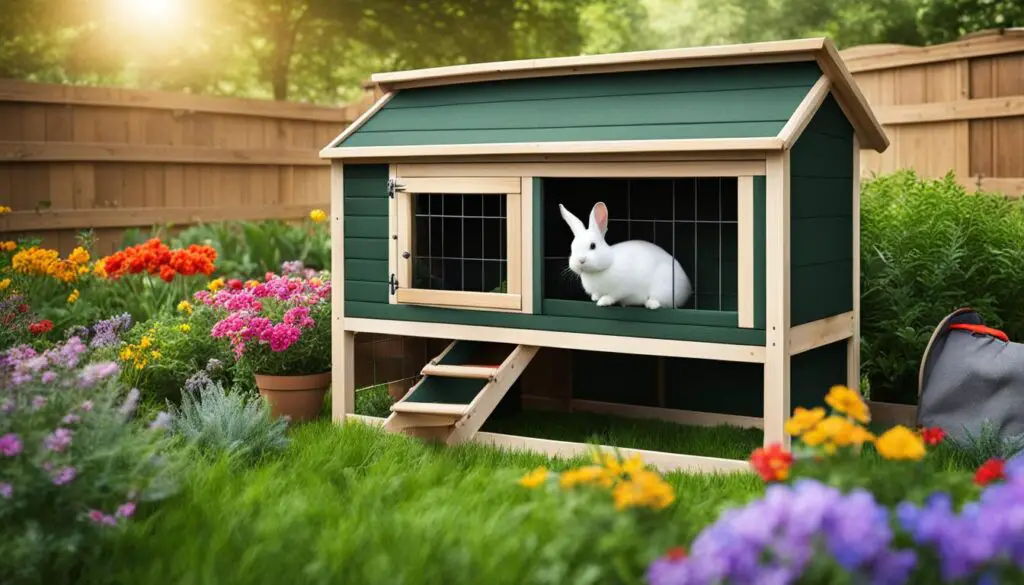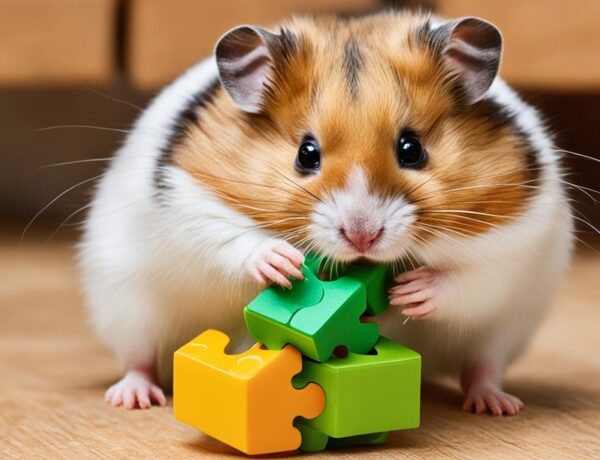Dealing with aggressive rabbit behavior can be a challenging situation for any rabbit owner. Aggressive rabbits may display behaviors such as biting, kicking, and lunging, which can be concerning and even dangerous. However, it’s important to remember that aggressive rabbits are not inherently mean – their behavior is often a result of underlying issues or external factors. By understanding these causes and implementing the right strategies, you can effectively manage and transform their behavior.
Key Takeaways:
- Aggression in rabbits is not uncommon and can be managed effectively with the right approach
- Rabbits display aggression as a means to express themselves or due to behavioral issues and external factors
- Identifying the underlying causes of aggression is crucial in addressing and managing the behavior
- Creating a safe and comfortable environment for rabbits can help reduce aggression
- Handling aggression issues requires patience, consistency, and positive reinforcement
The Nature of Rabbit Aggression
Aggression is a common issue in rabbits and can manifest in various ways, such as biting, kicking, and lunging. It’s important to understand that aggressive behavior in rabbits is not inherent. Instead, it is typically a result of underlying behavioral issues or external factors.
Several causes can contribute to aggressive rabbit behavior. Sexual frustration, fear, territoriality, and pain are common factors that may trigger aggression in rabbits. Identifying the root causes of aggression is crucial in effectively addressing and managing such behavior.
Understanding the specific factors contributing to aggressive behavior in rabbits allows us to tailor our approach and implement appropriate strategies to modify and redirect their behavior.
Here is a breakdown of common aggression causes in rabbits:
| Causes | Description |
|---|---|
| Sexual Frustration | Unaltered rabbits may exhibit aggressive behavior due to hormones and reproductive instincts. |
| Fear | Rabbits may become aggressive when they feel threatened or scared. |
| Territoriality | Rabbits can become possessive and aggressive when defending their territory. |
| Pain | Illness, injury, or physical discomfort can result in aggressive behavior in rabbits. |
Identifying the aggressive behavior causes allows us to address the root issues and take the necessary steps to manage and prevent aggression in rabbits. With a comprehensive understanding of the nature of aggressive behavior, we can implement strategies that promote a harmonious and peaceful environment for our furry companions.
Common Aggression Scenarios and Solutions
Aggression in rabbits can manifest in a variety of scenarios, each requiring a tailored approach to address the underlying causes and effectively manage the behavior. By understanding these common aggression scenarios and implementing appropriate strategies, rabbit owners can foster a harmonious relationship with their furry friends.
Circling and Biting Ankles
One aggressive rabbit behavior scenario involves circling and biting ankles, often seen as a territorial display or a result of fear. It is crucial to create a safe environment for rabbits, providing hiding spots and ensuring they have enough space. Additionally, redirecting their behavior using positive reinforcement techniques can help address this aggression issue.
Lunging at Hand Approaches
Another scenario is when rabbits lunge at hand approaches as a defensive response. This behavior can often be attributed to fear or feeling threatened. To address this aggression, it is essential to approach rabbits calmly and slowly, giving them space and time to feel comfortable. Earning their trust through positive reinforcement, such as offering treats, can help overcome this defensive behavior.
Biting While Trying to Stop Unwanted Behaviors
Rabbits may exhibit aggression by biting when attempting to stop unwanted behaviors, such as chewing on furniture or wires. It’s important to redirect their attention to appropriate chew toys and reinforce positive behaviors. Avoid physical punishment, as it can escalate their aggression and damage the bond between you and your rabbit.
Neutering or spaying rabbits can significantly reduce aggression related to sexual frustration. This procedure not only helps prevent unwanted pregnancies but can also alleviate dominant behavior patterns in rabbits.
Understanding rabbit body language is crucial in addressing and preventing aggressive behaviors. By recognizing their signals and responding appropriately, you can defuse potentially aggressive situations and establish a more trusting relationship. For example, a rabbit’s body language may include a raised tail, bared teeth, or an alert posture as signs of aggression.
Addressing aggression in rabbits requires a comprehensive approach that encompasses a safe environment, positive reinforcement, and understanding their unique body language. By implementing these strategies, you can nurture a peaceful and loving bond with your rabbit.
Signs and Communication of Aggressive Rabbits
Rabbits, like humans, communicate their emotions and intentions through body language. Understanding the signs of aggression displayed by rabbits is essential in managing their behavior and promoting a safe and peaceful environment. By recognizing these signals early on, rabbit owners can take appropriate measures to address aggression and ensure the well-being of their furry companions.
Common Signs of Aggression in Rabbits
Rabbits express their aggression in different ways, and being able to identify these signs is crucial. Here are some common indicators of aggressive behavior:
- Posturing: Aggressive rabbits often adopt defensive postures, such as standing tall, raising their front feet, or lunging forward.
- Bared Teeth: Teeth grinding or baring is a clear sign that a rabbit is feeling threatened or exhibiting aggression.
- Raised Tail: A raised tail is another visual cue that rabbits use to communicate their aggression. It typically indicates dominance or territoriality.
- Alert Posture: Aggressive rabbits maintain an alert and tense body posture, with their ears upright and focused on potential threats or perceived opponents.
- Vocalizations: Rabbits may emit snorting or growling sounds when displaying aggression.
Recognizing these signs allows rabbit owners to intervene early and respond appropriately to avoid potentially harmful situations. It is important to note that not all rabbits display aggression in the same way, so it’s crucial to observe and understand the unique body language of each individual rabbit.
| Signs of Aggression | Description |
|---|---|
| Posturing | Aggressive rabbits adopt defensive postures like standing tall, raising their front feet, or lunging forward. |
| Bared Teeth | Teeth grinding or baring indicate a rabbit feeling threatened or exhibiting aggression. |
| Raised Tail | A raised tail indicates dominance or territoriality in aggressive rabbits. |
| Alert Posture | Aggressive rabbits maintain an alert and tense body posture, with their ears perked up and focused on potential threats. |
| Vocalizations | Snorting or growling sounds may accompany displays of aggression in rabbits. |
Understanding and interpreting these signs of aggression is crucial for properly managing rabbit behavior. When confronted with an aggressive rabbit, it is important to give them space and avoid initiating physical contact. Seeking guidance from a rabbit-savvy veterinarian or animal behaviorist can also be beneficial in addressing aggression and promoting a peaceful coexistence between rabbits and their human companions.
Creating a Safe Environment for Rabbits
A safe and comfortable environment plays a crucial role in reducing aggression in rabbits. By providing them with a secure and stress-free space, you can create a harmonious environment that promotes their well-being. Here are some essential factors to consider when creating a safe space for your rabbits:
1. Providing Adequate Space
Rabbits need plenty of room to hop, explore, and exercise. Lack of space can lead to frustration and aggression. Ensure your rabbits have a spacious enclosure or hutch that allows them to move freely. In addition, providing them with opportunities for supervised outdoor playtime can be highly beneficial for their mental and physical health.
2. Offering Hiding Spots
Rabbits are prey animals by nature and need hiding spots to feel secure. Place boxes, tunnels, or cozy shelters in their living area where they can retreat to when they feel the need to hide or relax. These hiding spots provide rabbits with a sense of security and can help reduce stress and aggression.
3. Accommodating Territorial Behavior
Rabbits are territorial animals and need their own space within their enclosure. Provide separate areas for eating, resting, and using the litter box. This arrangement allows them to establish their territories, reducing the likelihood of aggressive behavior triggered by territorial disputes. It’s also important to avoid overcrowding and ensure each rabbit has enough resources.
| Providing a Safe Environment for Rabbits | Benefits |
|---|---|
| Enough space for hopping, exploring, and exercise | Reduces frustration and prevents confinement-related aggression |
| Hiding spots like boxes or tunnels | Creates a sense of security and reduces stress |
| Separate areas for eating, resting, and using the litter box | Reduces territorial conflicts and promotes peaceful coexistence |
4. Taking a Calm and Gentle Approach
When interacting with your rabbits, it’s important to remain calm, gentle, and patient. Sudden movements, loud noises, or rough handling can startle rabbits and may trigger defensive or aggressive behavior. Approach them slowly and avoid abrupt gestures. This gentle approach helps to foster trust and create a positive association with human interaction.
5. Spaying or Neutering Rabbits
Spaying or neutering your rabbits can significantly reduce aggression, particularly related to sexual frustration. These procedures eliminate the hormonal factors that contribute to aggressive behavior. Consult with a trusted veterinarian to discuss the appropriate age and timing for spaying or neutering your rabbits.
6. Ensuring a Healthy Diet
A nutritious and balanced diet is essential for maintaining a rabbit’s physical and mental well-being. Provide them with fresh hay, a variety of leafy greens, and a limited amount of pellets. A healthy diet helps prevent potential health issues that may cause pain and discomfort, which can contribute to aggression.
By implementing these strategies and creating a safe environment for your rabbits, you can effectively reduce aggression and promote their overall welfare. Remember, a stress-free and secure space is fundamental to fostering a harmonious relationship with your furry companions.
Handling Aggression Issues in Rabbits
When dealing with aggression in rabbits, it is crucial to approach the situation with patience, consistency, and understanding. Aggressive behavior can often be a result of fear, insecurity, or past experiences, making it essential to establish trust with your rabbit through positive reinforcement methods.
Firstly, it is important to avoid any form of physical punishment when managing aggressive rabbits. Physically punishing a rabbit not only fails to address the underlying issue but can also worsen their aggression and damage their trust in you as their caregiver. Instead, focus on establishing a positive environment where your rabbit feels safe and secure.
Allowing rabbits to approach you on their terms can go a long way in building trust. Avoid forcing interactions or invading their personal space. Instead, let them come to you when they feel comfortable and ready. This approach helps to alleviate any insecurities your rabbit may have and allows for a closer bond to develop over time.
Providing both mental and physical stimulation is crucial in managing aggression in rabbits. Boredom and lack of enrichment can contribute to aggressive behaviors. Ensure that your rabbit has plenty of toys, hiding spots, and opportunities for exercise. This will help redirect their energy in a positive way and prevent frustration that can lead to aggression.
Consulting with a Veterinarian
It’s crucial to consult with a reliable veterinarian to rule out any underlying health issues that may contribute to aggressive behavior in rabbits. Certain medical conditions or pain can manifest as aggression. Seeking professional guidance will ensure that your rabbit’s overall health is addressed and that the appropriate steps are taken to manage their aggression effectively.
Tips for Establishing Trust:
- Use positive reinforcement techniques, such as rewards and praise, to reward desirable behavior and encourage trust.
- Respect your rabbit’s boundaries and avoid sudden movements that may startle or distress them.
- Take the time to understand your rabbit’s body language and respond accordingly.
Remember, establishing trust and managing aggression in rabbits takes time and effort. With a patient and consistent approach, you can create a positive environment where your rabbit feels safe, secure, and understood.
Conclusion
Managing aggressive behavior in rabbits requires a comprehensive understanding of their behavior and needs. By delving into the underlying causes of aggression, rabbit owners can effectively address and transform their furry friends’ behavior. It is crucial to create a safe and secure environment for rabbits, providing space, hiding spots, and accommodations for their natural instincts. Building trust through positive reinforcement and avoiding physical punishment are key in establishing a harmonious relationship.
Remember, aggression in rabbits is not a permanent trait. With time, patience, and love, their behavior can be changed, and a closer bond can be formed. Implementing appropriate strategies and seeking professional guidance when needed can make a significant difference in managing aggressive rabbits.
Understanding rabbit behavior and taking proactive measures can lead to a rewarding relationship with these intelligent and affectionate animals. By actively managing aggressive behavior, rabbit owners can create a peaceful environment and enjoy the countless joys of interacting and caring for their beloved pets.
FAQ
How common is aggressive behavior in rabbits?
Aggressive behavior in rabbits is not uncommon and can be managed effectively with the right approach.
Are rabbits inherently aggressive?
No, rabbits are not inherently mean, and their behavior can be changed through training and proper care.
What are some common causes of aggression in rabbits?
Common causes of aggression in rabbits include sexual frustration, fear, territoriality, and pain.
How can I recognize signs of aggression in rabbits?
Common signs of aggression in rabbits include posturing, bared teeth, raised tail, alert posture, and vocalizations like snorting and growling.
How can I create a safe environment to reduce aggression in rabbits?
Providing enough space, hiding spots, and accommodations for territorial behavior, as well as taking a calm and gentle approach when interacting with rabbits, can help reduce aggression.
What strategies can I use to handle aggression in rabbits?
Handling aggression in rabbits requires patience, consistency, and understanding. Avoiding physical punishment, establishing trust through positive reinforcement, and seeking professional guidance when needed are important strategies to consider.
Can aggressive behavior in rabbits be changed?
Yes, aggressive behavior in rabbits can be changed with time, patience, and love, as well as understanding the underlying causes and implementing appropriate strategies.







No Comments